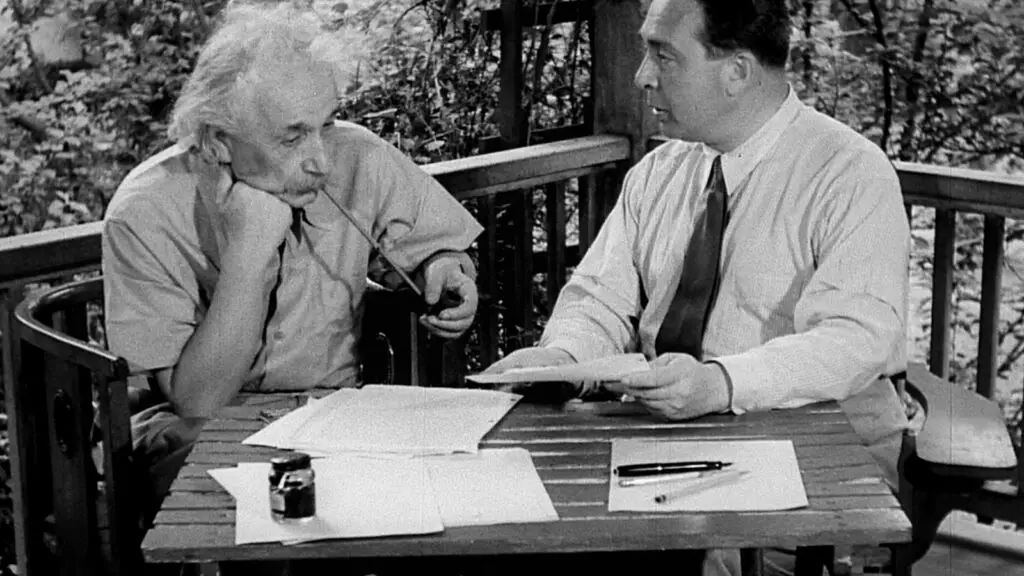
Netflix
award master oppenheimer The film is a blockbuster portrayal of a scientist’s deep and complex feelings about his role in the creation of the atomic bomb and its subsequent use in the destruction of the Japanese cities of Hiroshima and Nagasaki. Netflix delivered a much leaner but thematically similar docudrama. einstein and the bombThis book tells the story of how this man widely considered the father of atomic energy came to influence the innovations of the Manhattan Project, and how he has lived to regret it. It is explained in detail.
This is a documentary drama in the truest sense of the word. Director Anthony Phillipson interweaves dramatic scenes of Einstein (played powerfully by the bright-eyed Aidan McArdle) with documentary footage. The script uses only words spoken or written by Einstein himself. The dramaturgy can be a bit clunky, and the hair and makeup won’t win an Oscar. But that’s not really the point. Rather than adopting the standard documentary format or low-budget biopic approach, the filmmakers manage to humanize history.
This movie could have been called einstein and the nazis. Rich footage of the rise of Hitler and the atrocities of the Third Reich fills the screen, and in the first half of the film Einstein’s theory of relativity, combined with the fact that he is Jewish, reveals how the Nazi regime It details what led him to condemn him and his questionable abstract research results. Early 1930s. Einstein realized early on the evil that Hitler could commit and sounded the alarm early on. This is an important context for subsequent developments. Already world-famous at the time and living on Long Island, Einstein wrote a letter to President Roosevelt in 1939 warning that Germany might be in the process of developing nuclear weapons, and that the United States was also busy developing similar weapons. suggested that it be done. . But he never considered the possibility that these weapons could be used to exterminate civilians in cities in other countries.

Aidan McArdle as Albert Einstein Einstein and the bomb.
Netflix
We see McArdle’s Einstein describing his radical pacifism, a pacifism so powerful that it ironically takes on a warrior-like quality. The film follows him fleeing Germany to a small cabin on the Norfolk moors, where he is entertained by Commander Oliver Locker-Lampson, a British politician and naval reservist played by Andrew Havill. This is also where his life is protected by two young women with guns. All true and very interesting.
As with many vivid documentaries, the editors are the unsung heroes here. Simon Barker nimbly jumps between time frames, pasting the right documentary footage into the right dramatic scenes and keeping it all humming along. einstein and the bomb ‘ is only 76 minutes long, but it feels even shorter. As the film sets its historical context and details Einstein’s escape from Germany in 1932, his rest in England, and finally his voyage to the United States, where he ended his life, this is not the case. You might start to wonder if that’s the case. Although it is a standalone document, it is the first episode of a series. Ross: What time will he get to Alamos? Where is Oppenheimer? Please remember that. Einstein was not at Los Alamos. He was deemed too great a security risk. But his ideas were there, mainly involving the fundamental atomic principle that a small amount of mass can generate enormous amounts of energy.
Einstein was an ardent pacifist who saw Nazi Germany as an existential threat to peace everywhere, especially for Jews. He later felt great pain at his role in unlocking what he called “Pandora’s Box” of nuclear weapons, the Hiroshima and Nagasaki massacres, and the subsequent nuclear insecurity that we experience to this day.in oppenheimer, Einstein is portrayed by Tom Conti only in scenes where he interacts with the main character. Here he will receive his soul. Frankly, this is something Netflix can and should do more of. It looks cheap but sharp, without any whiff of sensationalism or cobbled together history. It has a point and vision appropriate to its subject matter.
